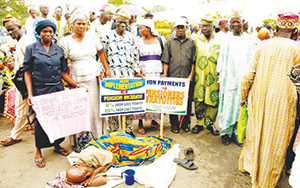In an ideal society, every employee looks forward to retirement. But the Nigerian society, due to maltreatment of retirees, has made the thought of retirement scary, forcing some workers to steal for the rainy day. With the celebration of International Day of Older Persons on October 1, Senior Correspondent, ONYEWUCHI OJINNAKA, x-rays Nigerian pensioners’ dilemma.

International Day of Older Persons was marked globally on October 1. By international standard, those that are 60 years and above are regarded as older persons. In Nigeria, retirement age from active service is 65 years, after which the retirees/older persons begin to enjoy their pension. A new law by former President Goodluck Jonathan also increases retirement age of staff in the professorial cadre in Nigerian universities to 70.
However, instead of enjoying their pension, it has become to them tale of woes.
History
On December 14, 1990, the United Nations General Assembly (UNGA) by Resolution 45/106 adopted October 1 of every year as the International Day of Older Persons. The resolution was preceded by initiatives such as the Vienna International Plan of Action on Ageing, which was adopted by the 1982 World Assembly on Ageing and endorsed later that year by the UNGA.
In 1991, the General Assembly by resolution 46/91) adopted the United Nations Principles for Older Persons and in 2002, the Second World Assembly on Ageing adopted the Madrid International Plan of Action on Ageing, to respond to the opportunities and challenges of population ageing in the 21st century and to promote the development of a society for all ages.
According to the UN report, in the next 50 years, the number of older persons in the world will grow from about 600 million to almost 2 billion. Currently, one in every 10 persons is aged 60 or above and, by 2050, it would be one person in five, and by 2150, one in three, with majority of them from the developing nations.
Such a major demographic change presents huge challenges. Therefore, the International Day of Older Persons aims to raise awareness of the impact of an ageing population and the need to ensure that people can grow old with dignity and continue to participate in society as citizens with full rights.
It is not only in developing countries that older persons’ role in development is critical. In Spain, for example, caring for dependent and sick individuals of all ages is mostly done by older people, particularly women.
Such contributions to development can only be ensured if those referred to as “senior citizens” enjoy adequate levels of health, for which appropriate policies need to be in place. In line with the Madrid International Plan of Action, the World Health Organisation (WHO) in 2002 launched a document titled ‘Active Ageing: A Policy Framework’, outlining its approaches and perspectives for healthy ageing throughout life.
Nigeria celebrates
Celebrating the day in Nigeria which coincided with the Independence anniversary, the National Human Rights Commission (NHRC) stated that it is pleased to note that issues bordering on elderly Nigerians are increasingly being brought to the fore.
To commemorate the day, NHRC in a statement by its Chief Executive Officer, Professor Bem Angwe, while recalling what led to the adoption of UN resolution of December 16, 1991, said: “It is therefore our delight to note that this year’s theme, ‘Sustainability and Age Inclusiveness in Urban Environment’ focuses on the germane issues that must be addressed to give the older persons enough latitude to actualise their rights in the society. It is quite ironical that the older persons who are required in the society for their wealth of experience to build the culture of an organised society are the same people being treated with disdain.
“Misconceptions and prejudices held about age have created a stigma around old persons by which they are seen as weak and no longer useful to the society. Consequently, when issues concerning the older persons are discussed, the perspective adopted is usually that of welfare considerations and social assistance measures. Now, the global trend depicts a radical departure from this cosmetic approach to a new order; that of the Rights of Older Persons.”
To actualise the rights of older persons in the society, the commission called on those who share the concerns of older persons, civil society organisations (CSOs) to come together and present a common front in pushing for the adoption of the Draft National Policy on Ageing.
Plight of Nigerian retirees
In Nigeria, it looks as if it is a curse to retire at the age of 65, whereas it is different in other parts of the world, especially the developed nations. As Nigeria joined the rest of the world to celebrate International Day for Older Persons, the need for government at all levels to put modalities in place for the welfare of senior citizens was emphasised.
There are widespread reports over the plight of senior citizens (pensioners) who are groaning in pains on account of unpaid pensions and difficulties they encounter under the country’s pension scheme. Some of them have died without getting their pension, some were reported to have collapsed while standing in the queue for verification exercise, while some could not even see their names in the pension register.
Expressing disgust over the pains pensioners go through, 75- year-old Hyacinth Nwosu who retired from the Nigeria Railway Corporation (NRC), said: “The pathetic situation is no longer news. It is bad enough that the system created pains. It is even worse that the agonies are sustained in both public and private sectors.”
Octogenarian, Thompson Edun, who retired from the Central Bank of Nigeria (CBN), recounted his ordeal while processing his pension, lamenting that he could no longer sustain the family due to non-payment of his pension.
In 1999, CBN pensioners sued the apex bank, its deputy governor and directors over non-harmonisation and payment of their pension. The bank had refused to comply with the federal government’s directive on pension harmonisation policy introduced in the public service with effect from January 1, 1997.
The then Justice Wilson Egbo-Egbo had, in his judgment, granted the reliefs sought by the pensioners and directed the CBN to pay the applicants/pensioners all accrued pensions with effect from January 1, 1997 on emoluments currently enjoyed by their serving counterparts. Unfortunately, CBN refused to implement the court’s decision, thereby elongating the sufferings of the pensioners.
In Abakaliki, Ebonyi State capital, the South East zone of the Nigerian Union of Pensioners (NUP) rose from its meeting lamenting the unpaid pensions and gratuities of its members for over 15 years in some states of the zone. In a six-point communique issued after the meeting, it urged the federal government to intervene in their plight and save them from hunger, frustration and untimely death due to hardship.
The communique, which was signed by the zonal chairman, Clement Igwe, and secretary, Livinus Ashiegbu, condemned the pension situation in the region, saying, “The governments are woefully unfriendly and insensitive to the plight of pensioners. Based on this development, the forum is calling on President Muhammadu Buhari to intervene in order to resolve the situation.”
The pensioners further urged the federal government to make a policy on the fate of pensioners who retired from July 2007 and compel state governments who have not implemented the contributory Pensions Act of 2004 to do so immediately.
In Bauchi State, retired civil servants have beseeched Governor Mohammed Abubakar to pay their N15 billion gratuity and pension arrears. Apparently aware that the state government has received N8.60 billion bail-out fund from the federal government, they demanded the state government to alleviate their suffering by payment of their pension.
Bauchi State NUP Chairman, Abu Gar, in an interview with newsmen, said: “With the bailout loan released to Bauchi State amounting to N8.6 billion, the government should look into the plight of pensioners who are owed N15 billion, to alleviate our suffering.”
He said retirees’ right to pension, as contained in the constitution, was in compliance with Section 16(2)(d) of the 1999 Constitution, which stipulates that “the state shall direct its policy towards ensuring that suitable and adequate shelter, suitable and adequate food, reasonable national minimum living wage, old age care and pension, sick benefits and welfare of the disabled are provided for all citizens”.
“We are suffering. Imagine, after several years of retirement, life has been very hard on us. Most of us have been living by the grace of our children. Many of us have been living at the mercy of God. Some of us are engaged in small-scale farming. We appeal to the government to use the bailout loan from the federal government to reduce the arrears of our gratuity and pension,” he pleaded.
Pension Reform Act
It is most worrisome that 11 years after the enactment of the Pension Reform Act of 2004, two major employers of labour in the country – state governments and the organised private sector – have been identified as major defaulters, following their failure to fully adopt and effectively operate the Contributory Pension Scheme (CPS).
It should be noted that the regulatory body, the National Pension Commission (PenCom), painted a gloomy and condemnable picture of pension operation in the public sector in its act implementation status report. Part of the report stated thus: “As at the end of the first quarter, 2015, 26 state governments had enacted laws on the CPS, while the remaining 10 were at the bills stage. Eight out of the 36 states had commenced remittance of contributions into the Retirement Savings Account (RSA) of their employees.”
Defaults
Interestingly, investigations vindicated the PenCom report. According to a recent report, “Many state governments are unable to pay pensions. Some do not remit their counterpart deductions, as required by the Pension Act, to workers’ respective Pension Fund Administrators (PFAs). Others, yet, have no plans or ideas on how to pay.
“Besides, many private sector organisations do not comply with Pension Act regulations requiring them to partner with workers in contributing to the scheme and providing how retirees would access their funds.”
Surely, the problem cannot wholly be attributed to the country’s supposed harsh economic realities. It goes beyond that factor and reflects a clear callousness to the circumstances of pensioners who have invested the energies of their active years only to be tortured by disappointment in retirement. It is unfair to the pensioners; and the defaulting parties must accept responsibility.
Put differently, the relevant authorities need to urgently address the injustice imposed on pensioners who are being prevented from reaping where they have sown by a system that is not working effectively.
Sadly enough, the plight of pensioners was summarised by the Chairman Enugu State Workers’ Forum, Osmond Ugwu, who was quoted as saying that the CPS prepares the retiree to die before his time, because there is nothing he is hoping on.
“This particular policy is entirely a policy of frustration and founded on injustice. It has nothing to benefit the worker. It is the lack of fiscal management that has brought this problem on workers,” he complained.
Last line
Uncertain future, due to difficulty to access retirement benefits, has been identified as one of the factors that promote financial crimes in the society. Workers would want to accumulate so much for the ‘rainy day’ which leads them to pilfering, as nobody cares for them as soon as they are no longer employed.
To arrest this development, those caught standing in the way between retirees and their benefits should be sanctioned. Sanctioning of defaulters would send a strong indication that the scheme is designed to work and so sabotage, in any form, would not be accepted. The country’s pensioners deserve peaceful retirement. The operation of the scheme meant to create an enabling environment must be disinfected to achieve its laudable objective.













